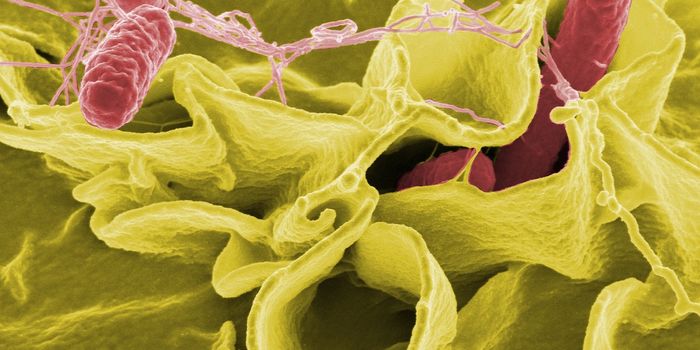The aryl hydrocarbon receptor (AHR) was initially characterized as one which mediates the effects of the pollutant dioxin and other xenobiotics, has recently been associated with the regulation of the body’s immune response. A group from Japan's Hokkaido University collaborating with colleagues from Canada and Norway have determined that AHR exerts its regulatory role through type-I interferon (IFN-1).
AHR was first identified over 35 years ago as the mediator of dioxin toxicity in the body. If dioxin enters the body, it will bind to AHR. The receptor will cause specific genes to be activated and produce their associated protein products, one called TIPARP. That protein then goes on to play a role in how the body reacts to the toxic pollutant.
As recently reported by
labroots, a team working at the
University of Bonn found that a variety of substances in the intestines can bind to AHR, which in turn down-regulates the action of the immune response. An appropriate level of response by the immune system is critical and is under the control of AHR and its repressor.
Expanding on those findings,
this new study, published in Nature Communications, has shown that AHR plays a role in the regulating how the immune system responds to viral infections.
The team at Hokkaido analyzed mouse cells that were deficient in AHR and compared them to normal cells containing AHR. They determined when the receptor is activated by amino acid metabolites, there is a reduction in the production of an antiviral protein called type I interferon (IFN-I).
The researchers found the receptor accomplishes that by activating the gene that encodes for a protein called TIPARP, TCDD inducible poly(ADP-ribose) polymerase. TIPARP subsequently interferes with the pathway (called the TBK1-mediated pathway) that normally stimulates interferon production after infection with a virus.
The researchers suggest that this AHR-mediated regulatory mechanism could aid in the protection of the host from harmful effects caused by excessive IFN-I activation (by turning it down). In addition, it is possible that during times of stress or nutritional deficiency, substances are produced that activate the receptor, causing a reduction in immune response to infection.
It is also proposed that identifying the factors and molecules that regulate the pathways stimulated by AHR activation could have clinical implications for controlling and treating pathological, dangerous innate immune responses.
Sources:
Nature Immunology,
AAAS/Eurekalert! via
Hokkaido University

![A detailed schematic of AHR signaling activated by endogenous ligands (Kyn, etc.) constitutively upregulates the levels of TIPARP, which interacts with TBK1 for the downregulation of TBK1 activity by ADP-ribosylation. This AHR-TIPARP axis plays a key role for tuning nucleic acid sensor-mediated type I IFN induction. TDO, tryptophan-2,3-dioxygenase; IDO, indoleamine-2,3-dioxygenase; Kyn, kynurenine; FICZ, 6-formylindolo[3,2-b]carbazole; AHR, aryl hydrocarbon receptor; TIPARP, TCDD-inducible poly(ADP-ribose) polymerase; TBK1, TANK-binding kinase 1; KD, kinase domain; ULD, ubiquitin-like domain; CC, coiled-coil; IRF-3, interferon regulatory factor-3; IFN, interferon. / Credit: Nature Communications Yamada et al](https://d3bkbkx82g74b8.cloudfront.net/eyJidWNrZXQiOiJsYWJyb290cy1hc3NldHMiLCJrZXkiOiJfcHVibGljXC9fZmlsZXNcL3N5c3RlbVwvY2tcL3RyZW5kaW5nXC9BSFIyXzE3OTEwMzBhZjQ5YWRiYTRiMTY2NDNhNTU5MTYyMTJmLmpwZyIsImVkaXRzIjp7InJlc2l6ZSI6eyJ3aWR0aCI6MTQwMCwiZml0IjoiY292ZXIifX19)




![Everything You Need To Know About NGS [eBook]](https://d3bkbkx82g74b8.cloudfront.net/eyJidWNrZXQiOiJsYWJyb290cy1pbWFnZXMiLCJrZXkiOiJjb250ZW50X2FydGljbGVfcHJvZmlsZV9pbWFnZV9mNTM1ZjIyYzA5MDE5ZmNmMWU5NmI0ZDc4NWU2MzdiZTZlN2I5ZDk5XzE4NDUuanBnIiwiZWRpdHMiOnsidG9Gb3JtYXQiOiJqcGciLCJyZXNpemUiOnsid2lkdGgiOjcwMCwiaGVpZ2h0IjozNTAsImZpdCI6ImNvdmVyIiwicG9zaXRpb24iOiJjZW50ZXIiLCJiYWNrZ3JvdW5kIjoiI2ZmZiJ9LCJmbGF0dGVuIjp7ImJhY2tncm91bmQiOiIjZmZmIn19fQ==)



